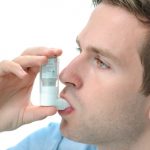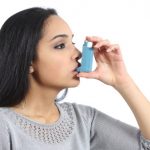World Asthma Day, which falls on May 3 this year, is fast approaching. In view of this, we want to educate our readers on some of the health conditions affected by asthma, including abdominal aortic aneurysm, pulmonary embolism, insomnia, and even pregnancy. Although it is a respiratory condition, asthma can affect health in other ways, too. For that reason, here are Bel Marra Health’s top stories regarding asthma and its impact on health.
 Asthma may raise abdominal aortic aneurysm risk
Asthma may raise abdominal aortic aneurysm risk
Asthma may raise the risk of abdominal aortic aneurysm. Abdominal aortic aneurysm is the weakening of the main blood vessel in the body. It can cause sudden death if it ruptures. The study uncovered that asthma patients had a greater risk of abdominal aortic aneurysm.
Advertisement
Other notable risk factors for abdominal aortic aneurysm include smoking, high blood pressure, higher cholesterol, obesity, and smoking-related lung diseases.
Lead author Guo-Ping Shi said, “Older patients, especially men, with a recent asthma diagnosis should be checked for signs of aortic aneurysm. In addition, patients with a diagnosed aneurysm who later develop asthma should also be monitored for changes in the size and strength of the aorta.”
In previous studies conducted on mice, Shi and his team found a link between asthma and abdominal aortic aneurysm. Mice with asthma were twice as likely to develop abdominal aortic aneurysm, compared to control mice. To confirm their findings, the researchers explored medical records from two studies – one study included 15,942 patients, the other – 18,749.
The researchers found that patients diagnosed with an abdominal aortic aneurysm and asthma within the last year had over a 50 percent chance of a ruptured aneurysm, compared to those without asthma. Patients diagnosed with asthma within the last six months had double the risk of an abdominal aortic aneurysm. Those who used anti-asthmatic medication in the last six months had a 40 percent greater risk of a ruptured abdominal aortic aneurysm, and patients who had recently used an inhaler had a 45 percent greater risk of aneurysm – compared to patients who are not on any anti-asthmatic drugs. Continue reading…
 Asthma patients face higher risk of pulmonary embolism, deep vein thrombosis
Asthma patients face higher risk of pulmonary embolism, deep vein thrombosis
Asthma patients face higher risk of pulmonary embolism and deep vein thrombosis. The findings were published in the European Respiratory Journal. Researchers looked at moderate to severe asthma sufferers and their risk of pulmonary embolism and deep vein thrombosis.
Pulmonary embolism is a condition in which the main artery of the lung or the bronchi becomes blocked as a result of deep vein thrombosis, which develops when a blood clot moves towards the lungs.
The study looked at 648 asthma patients aged 18 to 88. History of asthma was examined, along with medication use and any previous diagnosis of pulmonary embolism and deep vein thrombosis. Results from the asthma patients were compared to individuals without asthma.
The findings revealed that asthma patients have a nine times greater risk of pulmonary embolism, in comparison to people without asthma. Additionally, those with mild to moderate asthma had 3.5 times greater risk of pulmonary embolism as well. Furthermore, the researchers identified corticosteroids as a potential risk factor for the risk increase.
Lead author Dr. Christof Majoor said, “This is the first time a link has been found between asthma and pulmonary embolism, and we believe these results have important clinical implications. Our findings suggest that people with severe asthma have an increased risk of pulmonary embolism, and doctors should increase their awareness of the possibility of this occurrence in order to help prevent this serious event.” Continue reading…
 Severe asthma linked to insomnia, sleep duration, and sleep hygiene in adolescents
Severe asthma linked to insomnia, sleep duration, and sleep hygiene in adolescents
Severe asthma is linked to insomnia, sleep duration, and sleep hygiene in adolescents. The findings were published in The Journal of Allergy and Clinical Immunology: In Practice. The researchers aimed to better understand modifiable health behaviors which may relate to asthma control. They highlighted sleep as one of those behaviors, but stated that it typically does not receive that much attention in regard to asthma control.
The researchers examined sleep duration, insomnia, and sleep hygiene in adolescents without asthma and with asthma to establish the effects of these factors on asthma control. The adolescents completed online surveys which the researchers then analyzed.
Sleep duration did not differ between the asthma group and non-asthma group, but asthma adolescents reported insufficient weekday sleep compared to the children without asthma (44 percent versus 31 percent, respectively). Asthma children also reported worsened sleep hygiene, and nearly double of asthma children reported insomnia, compared to children without asthma.
The researchers concluded that children with severe asthma experience insomnia, less sleep duration, and poorer sleep hygiene, when compared to children without asthma. Continue reading…
 Asthma and atopy linked to an increased risk of suicide, depression in young adults
Asthma and atopy linked to an increased risk of suicide, depression in young adults
Asthma and atopy is linked to an increased risk of suicide and depression in young adults. Atopy is a genetic predisposition to develop allergies. It is characterized by a heightened immune response towards allergens.
Previous research has found associations between asthma and atopy, and an increased risk of suicide and depression. The researchers at the University of Bristol found the link between pre-defined asthma and atopy with suicide by examining the Glasgow Alumni cohort study, which looked at university student data and smoking habits. The study also provided students’ mental health information as well.
Data was collected from 11,463 participants where 32 suicides were reported. The researchers examined socioeconomic positions and smoking habits with regards to the risk of suicide.
Atopy was more prevalent in females, and asthma was seen higher in males. Females reported greater depression or poorer mental health, compared to males. Further analysis did reveal that students who had a combination of hay fever, eczema, and a family history of atopy had a higher risk of suicide, but the findings are based on a small group. Continue reading…
 Asthma affects fertility treatment in women, prolongs time to pregnancy, and lowers birth rate: Study
Asthma affects fertility treatment in women, prolongs time to pregnancy, and lowers birth rate: Study
Asthma affects fertility treatment in women, prolongs time to pregnancy, and lowers birth rate, according to research. Until now, the association between asthma and fertility has yielded conflicting results, but the latest studies used more in-depth testing for the investigation.
Advertisement
For the current study, researchers looked at 245 women aged 23 to 45 with unexplained fertility problems. The women underwent asthma and allergy testing, and had to complete questionnaires during their fertility treatment. Ninety-six women had either an existing diagnosis of asthma or were diagnosed with asthma upon entering the study.
The researchers monitored the women during their fertility treatment for at least 12 months, until they achieved a successful conception, stopped treatment or the observation ended.
Median total time to achieve pregnancy was 32.2 months in non-asthmatic women and 55.6 months in asthmatic women. Asthmatics also had fewer successful conceptions – 39.6 percent – compared to 60.4 percent of non-asthmatic women.
Lead author Dr. Elisabeth Juul Gade said, “This finding in a clinical trial setting adds new weight to the epidemiological evidence suggesting a link between asthma and fertility. We have seen here that asthma seems to have a negative influence on fertility as it increases time to pregnancy and even more so with age. We do not yet know the causal relationship. It may be complex with different types of asthma, psychological wellbeing, asthma medication, and hormones all play a role. Given this new evidence, we believe that clinicians should encourage women with asthma to become pregnant at an earlier age and optimize their treatment for asthma preconception. Patient education is also of paramount importance as adherence to treatment may be enhanced if patients are informed of this link.” Continue reading…
